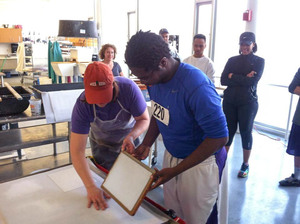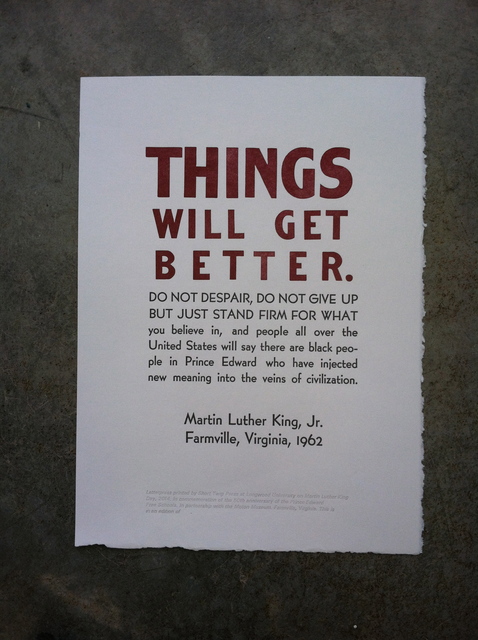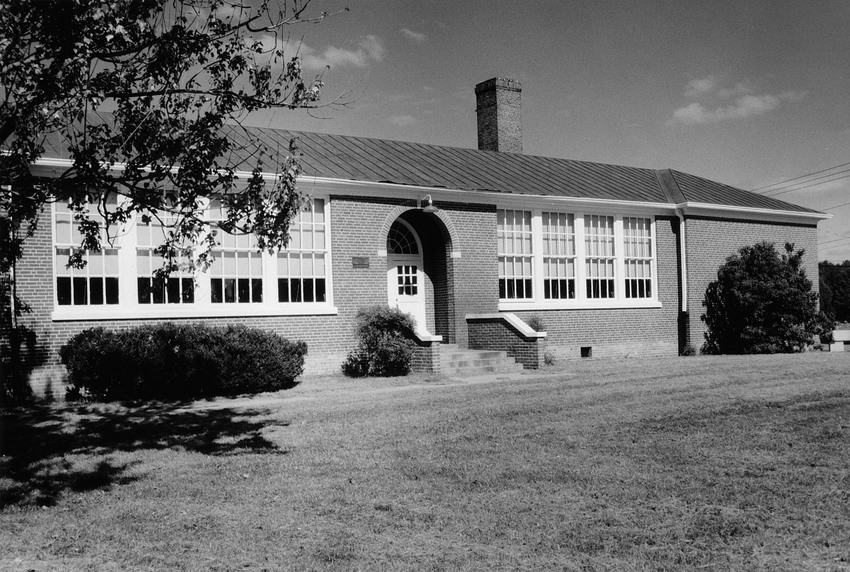A Longwood University project is commemorating the 50th anniversary of a private effort to educate schoolchildren in Prince Edward County, where public schools closed from 1959-64 rather than comply with integration.
The project is a limited-edition artist book featuring the stories of students who attended the temporary Free Schools, which were privately operated during 1963-64, or who were unable to attend school because of the closings. Titled Unbound, the book is being created by two book artists, one a Longwood art faculty member and the other a visiting artist, and a group of Longwood students. Partnering with the university in the project is the nearby Moton Museum, which is located in a building that housed one of the Free Schools.
Unbound will be letterpress-printed on paper made by hand by a wide spectrum of community members, including former students of the Free Schools. The 100 limited-edition copies of Unbound will be sold by Longwood and the Moton Museum, where the bookwill be unveiled in an event April 7.
"The book is a history of that period from the student perspective," said visiting artist Jessica Peterson, a letterpress printing specialist who lives in Tuscaloosa, Ala. "Much of my work deals with race, civil rights and the American narrative, and the story of Moton and the Free Schools is a really interesting American story."
It’s unusual, said Peterson, for an artist book to be made of handmade paper [fibers from abaca and cotton plants] and also unusual for the papermaking to involve a cross-section of the community. Those who helped include students at Prince Edward County and Cumberland County high schools, veterans of the Farmville civil rights movement, local church members and Chinese visiting scholars at Longwood. "It’s been a wonderful experience," said Peterson.

Peterson, an adjunct instructor in the University of Alabama’s book art program and co-owner of Southern Letterpress, has been working on the project with Kerri Cushman, associate professor of art at Longwood, and with students in the class they are teaching jointly this spring.
"We’re doing this project to give these former students a voice and an opportunity to tell their story," said Cushman, a papermaking specialist. "This is something that can be passed on to future generations and is one way in which we’re building a sense of community. We’re bridging the gap between the campus and the town."
The project is supported by Longwood’s art and history departments, the Cook-Cole College of Arts and Sciences and the Cormier Honors College, as well as through grants from the American Democracy Project and the Longwood Parents Council.
"It’s unusual for an art department to be involved in something like this. Most art departments don’t look outside themselves," said Peterson, who described the book as similar to one she did on Hurricane Katrina.
Proceeds from copies of the book sold by Longwood will be split between the Moton Museum and Short Twig Press, a fine art press started by Cushman.
About 1,500 Prince Edward County students, nearly all of them black, attended the Free Schools, which met in four public school buildings leased by the Prince Edward Free School Association. Supported by federal officials (Attorney General Robert Kennedy visited Farmville in May 1964 to observe the Free Schools) and private funds, the effort was governed by a board of trustees chaired by prominent Virginian Colgate Darden.
Lacy Ward Jr., director of the Moton Museum, praised the quality of instruction provided at the Free Schools and Darden’s leadership of them. "I like Colgate Darden’s quote, ‘I’ve been a congressman, a governor and a university president, but this is the most important service I have ever rendered my native state.’"
Dr. Larissa Smith Fergeson, a Longwood history professor involved with the project, said that Free School teachers "employed innovative teaching methods to prepare students for the return of public education," which occurred as a result of a U.S. Supreme Court ruling two weeks after Robert Kennedy’s local visit.




Leave a Comment